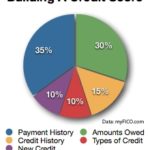Who Cares?
It’s not just banks and lenders that rely on credit scores to help make important credit decisions. Nowadays landlords, employers, insurance companies, and even cell phone and other utility companies all reportedly utilize credit scores to decide how they treat relationships with potential customers.
This means that your credit is the most important component of your entire financial portfolio. Because of this, monitoring and managing your FICO score is super important, especially if you’re looking to buy or refinance a home anytime in the near future.
What’s a FICO Score?
The FICO scoring system was created in the 1960s by Fair Isaac Corporation and has been the standard for lenders since the 1980s. FICO credit scores typically range between a low score of 350 and a high score of 850. Under the FICO system, securing credit becomes less expensive for borrowers with higher scores (people who are a lower risk) and more expensive for borrowers with lower scores (people with a higher risk).
Truth is, when it comes to a mortgage – a lower credit score could easily cost a consumer hundreds of thousands of dollars more in interest throughout the life of the loan, compared to the same loan with a higher score.
The Dollars and Cents
Below is an example of credit scores and the higher cost of borrowing money on a home. The following example on a 30 year mortgage (originally compared on MyFico.com).
|
FICO Scores |
APR |
Monthly Payment |
|
760-850 |
5.751% |
$1,751 |
|
700-759 |
5.973% |
$1,793 |
|
660-699 |
6.257% |
$1,849 |
|
620-659 |
7.067% |
$2,009 |
|
580-619 |
9.165% |
$2,449 |
|
500-579 |
10.194% |
$2,676 |
The above comparison shows the relationship between higher FICO scores and lower interest rates and monthly mortgage payments. Experian®, one of the three main credit bureaus in the US says, FICO scores also accurately reflect “the likelihood of a borrower becoming delinquent on a loan or credit obligation in the future.” In my language, the FICO scoring model looks at the past to “predict” the future risks of a borrower to a bank or lender, and then prices the loan accordingly.
Changing Times and Loan Level Price Adjustments
Not long ago, a FICO score of 680 was respectable. In a tough credit market like today’s, however, a 680 could be devastating to the bottom line of consumers looking to buy or refinance a home. In fact, thanks to Loan Level Price Adjustments (LLPA) from Fannie Mae and Freddie Mac, having less than a 720 in today’s credit environment will cost you big: up to 2% in points or up to a 1% increase in your interest rate!
LLPAs are mandatory surcharges based strictly on credit scores. They are additional fees paid to Fannie Mae or Freddie Mac, not your mortgage professional. Analysts suggest that imposing these “penalties” is a blatant effort to recoup – and to help lessen further losses – on foreclosures. The surcharge could mean thousands of dollars for borrowers who do not monitor and maintain a good credit rating.
The Sales Pitch
If you’re thinking about buying, selling, or refinancing a home, you have to be credit ready. Give me a call today for a free credit consultation. I’ll pull your credit and see where you stand. Remember, effective credit repair, if necessary, could take up to 3-6 months, so act now and be credit ready in no time.
Not a Reader?… Want to Watch a Video on This Topic?
For more information, here’s a video on the different impacts credit scoring might have on you!










